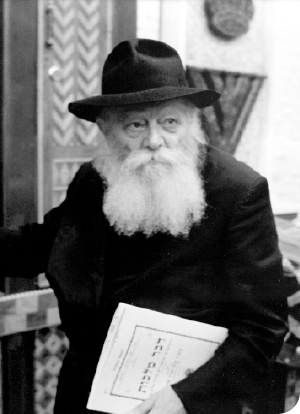When the Rebbe instructs us to publish a book or pamphlet, he intends that we publish it as widely as possible, so that the subject matter may be understood by the greatest number of people. This includes issues previously hidden and known only to a select few in an entire generation.
Translated by Boruch Merkur
 1. This farbrengen is connected with Chaf MarCheshvan, the birthday of the Rebbe (Rashab), whose position was filled by my revered father in-law, the Rebbe. Moreover, the Rebbe was his inheritor, who is tantamount to the one who bequeaths (Bava Basra 159a), as well as his only son.
1. This farbrengen is connected with Chaf MarCheshvan, the birthday of the Rebbe (Rashab), whose position was filled by my revered father in-law, the Rebbe. Moreover, the Rebbe was his inheritor, who is tantamount to the one who bequeaths (Bava Basra 159a), as well as his only son.
The general concept of and the special virtue of a birthday was revealed through the Rebbe [Rayatz] (HaYom Yom, pg. 44). Later, he instructed that this message be published in order for it to be publicized to everyone.
The Rebbe utilized print media for publicity because the press is far reaching, gaining exposure not only to a select few, and not only to a particular group with special customs (including this custom), but to all Jews. And this broad publicity also applies to ideas that maintain relevance through time (and thus are heard) for generations to come.
That is, the importance of marking a birthday was totally unknown until the time came when the Rebbe disclosed it. And when it was revealed by the Rebbe, the publicity he sought to promote this formerly unknown idea was simply radical – from one extreme to the other:
Before the concept of observing a birthday was revealed, even the elite were unaware of it; only singular individuals knew. But when it was revealed, it was publicized (not only to a select few or to very close adherents, but) to all Jews, and even for generations to come.
2. There are those, however, who seek to be provocative by asking: What is the source for the idea of celebrating a birthday? What cause is it for rejoicing? And where is there precedence for such a thing?!
If it is something that is indeed proper and good and necessary, how could it be that it remained unknown throughout all previous generations?!
The answer to this question is that we find many Torah concepts that were first revealed in a particular epoch. The ideas were previously unknown until the time came when the concept was finally taught.
Even regarding the Written Torah, we find that much was revealed after Mattan Torah. How much more so with regard to the Oral Torah, teachings that “a scholar innovates in the future,” for prior to the “scholar” innovating this teaching, it was unknown to us. (Although it was indeed “given to Moshe at Sinai,” it is nevertheless a concept that the “scholar” reveals and innovates.)
Prior to a certain point in history the concept had not been revealed in Torah. Thus, before its origination it was not obligatory. Needless to say that until the time came for the matter to be revealed, it did not possess the quality of “it is greater that one is commanded and performs it [than performing it voluntarily].”
This phenomenon is understood even by “a five year-old [who] learns Scripture,” for he sees in the Written Torah that some things are only revealed after time. How much more so when he becomes “a ten-year-old [who] learns Mishna,” when he observes it on a broader scale in the Oral Torah. And when he becomes “a thirteen year old [who performs] Mitzvos,” being now obligated in Mitzvos, he then sees how it applies in the realm of practical halachic rulings.
3. The same principle applies to Torah as a whole:
It says in Midrash that “Adam HaRishon was fit to have had the Torah given [to humanity] through him,” however, “He made everything beautiful in its time,” and the Giving of the Torah actually took place twenty-six generations later.
At first glance, this Midrash is puzzling. Since “He gazed into the Torah and created the world (u’bara alma)” and the entire world was created “for the sake of the Torah, which is called ‘reishis,’” the Giving of the Torah should have taken place immediately at the beginning of Creation. Nevertheless, we say that “He made everything beautiful in its time,” and the time for the Giving of the Torah only arrived after twenty-six generations!
Similarly in our case, with regard to celebrating a birthday. There was a time when the concept of celebrating a birthday was unknown. But eventually, when the time was right, my revered father in-law, the Rebbe, revealed it (as the Rebbe said regarding a number of things: when the time came for it to be revealed, it was revealed).
As stated above, throughout the entire Torah there are matters that are first revealed only when a particular time arrives – both with regard to Biblical laws and how much more so with regard to a “Jewish custom.”
Our generation is distinguished with having numerous previously unknown teachings revealed. Since the time has now come when everything must be revealed with haste, “achishena,” therefore, they cannot be shelved for a later date.
(The address given on Shabbos VaYeira, 20 MarCheshvan, 5740; Likkutei Sichos Vol. 20, pg. 386-7)